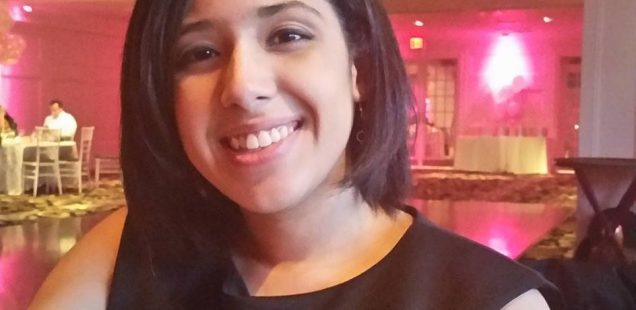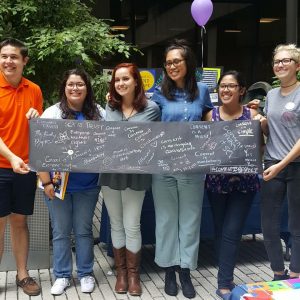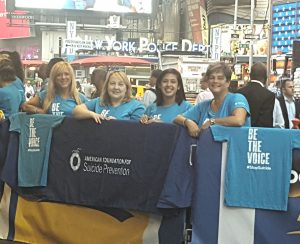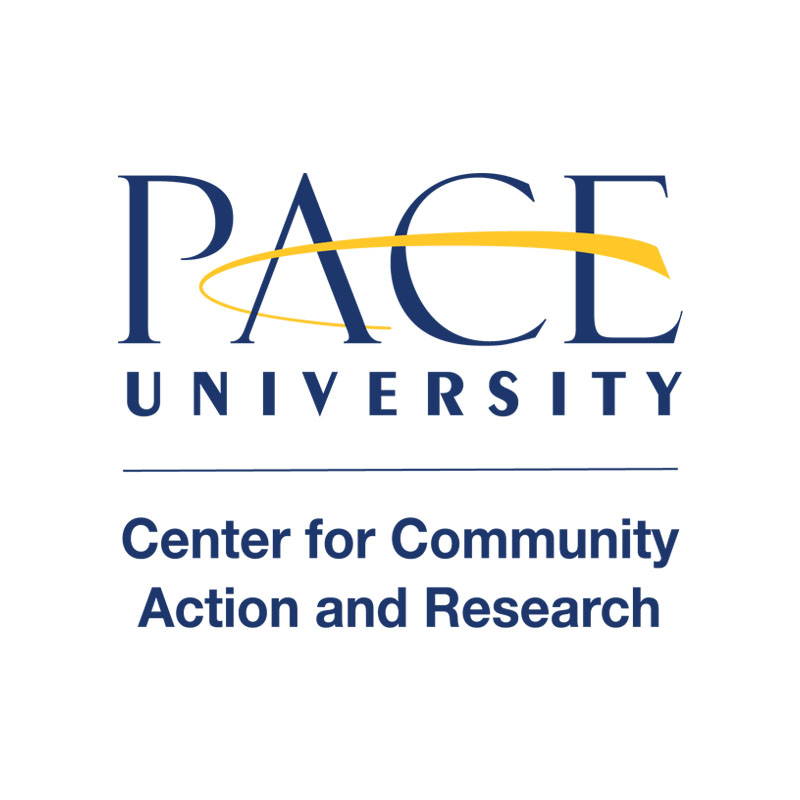
Activist Spotlight: Victoria Gonzalez ’18
During her undergraduate years at Pace, Victoria Gonzalez has done advocacy work on issues dealing with ending sexual violence and mental health awareness, and she works closely with the Helene and Grant Wilson Center for Social Entrepreneurship. We’re excited to to highlight her contributions to the Pace community and the work that she’s doing to plan Pace University’s first ever “Out of the Darkness Campus Walk” that will raise funds for the American Foundation for Suicide Prevention.
Year of Graduation: 2018
Major: Pforzheimer Honors College Bachelors in Political Science/Master in Public Administration Combined Degree
Minor: Nonprofit Studies and Psychology Double Minor
The stigma attached to mental health has kept me silent. Now being an activist has given me the courage to talk about it, learn more about it, and encourage others to do the same.
You’re a huge advocate on issues of mental health and ending sexual violence –Would you mind sharing how you became involved with those?
There is a saying – “the personal is political” – which I think sums up why these issues matter to me and how I got involved in activism. I know people who have been sexually assaulted and I grew up internalizing the blame society has placed on victims, especially the blame placed on women. Like “she shouldn’t have worn that,” “she gave him mixed signals,” etc.
For a long time, I accepted that I couldn’t change these attitudes, because I was just one person. I didn’t think that I could make a difference. But in my freshman year at Pace, I started reading articles about how survivors of rape on college campus were coming forward and that there were a lot of people, students, who were standing up for them. And I realized that I could do the same. So, in summer of 2014, I co-founded #PaceUEndRape with my friends Nelli Agbulos and Larissa Szilagyi, to and make our campus safer for all students. In just three years, we have accomplished so much. Our group has collaborated with faculty and other student organizations on events promoting affirmative consent and #PaceUEndRape has even helped reform our school policy on sexual assault.
I think I really started being a “mental health advocate” after co-founding #PaceUEndRape. Since middle school, I have personally struggled and kept silent. The stigma attached to mental health has kept me silent. Now being an activist has given me the courage to talk about it, learn more about it, and encourage others to do the same. This semester I have been working with other students and faculty who want to end this stigma. On Friday April 28th, we are hosting a Pace University Out of The Darkness Walk in front of One Pace Plaza to raise funds for the American Foundation for Suicide Prevention’s mental health awareness and suicide prevention efforts. We’re excited to see that over 50 students, faculty, and community members have signed up so far to support this important cause! It’s wonderful to see so many people care about these issues and are willing to step up as advocates.
It takes a lot of strength to talk about issues of mental health (e.g. such as suicide and depression), sexual violence, and the rights of people with disabilities – those are personal issues that come with preconceived stigma and also reveal a person’s vulnerable side. In your opinion, how can individuals – particularly those with a personal connection to those issues – make safe spaces for others to share their stories?
 People have to become these safe spaces before creating a physical space for others to share their experiences. You have to ask yourself this question: In what ways do I contribute to the problem? Imagine you are with friends and, in a poor attempt to be funny, you make a comment about how someone you know is “totally bipolar” because of X, Y, and Z. Now, imagine one of your friends is struggling with bipolar disorder or another mental illness and you don’t know. Would your friend open up to you after hearing that “joke”? About 5.7 million American adults are diagnosed with bipolar disorder. So, it’s really important that people keep in mind that words matter, that we can be a part of the problem too. As an advocate and someone who has struggled with mental health, I have had to keep myself in check too. I have made statements and “jokes” that were problematic, but you live and you learn.
People have to become these safe spaces before creating a physical space for others to share their experiences. You have to ask yourself this question: In what ways do I contribute to the problem? Imagine you are with friends and, in a poor attempt to be funny, you make a comment about how someone you know is “totally bipolar” because of X, Y, and Z. Now, imagine one of your friends is struggling with bipolar disorder or another mental illness and you don’t know. Would your friend open up to you after hearing that “joke”? About 5.7 million American adults are diagnosed with bipolar disorder. So, it’s really important that people keep in mind that words matter, that we can be a part of the problem too. As an advocate and someone who has struggled with mental health, I have had to keep myself in check too. I have made statements and “jokes” that were problematic, but you live and you learn.
I think that being Latina has made my feminism more intersectional. Feminism is more than just achieving equality of the sexes. It’s a lot more complicated than since gender alone does not shape a person’s life experience. For instance, we’ve heard that women make 75 cents to a man’s dollar, right? But that’s a white woman compared to a white man. A Latina earns about 60 cents to a white man’s dollar. So I think that understanding these dynamics has made me take a closer look at the how different groups are affected by the issues that I care about. Mental health stigma looks very different in Latina communities compared to Asian communities, and so on and so forth. As advocates, we can’t assume that there is a “one-size fits all” solution to these problems. Having this perspective makes our work more difficult, but also more impactful.
What has been one of your most rewarding moments as an activist?
I think besides co-founding #PaceUEndRape, one of my most rewarding moments has been co-organizing the Pace University Out of the Darkness Campus Walk. The purpose of the walk is to bring Pace together as a community and really start a dialogue about mental health. The fact that so many people have pledged to walk is proof that students want to have this conversation. After the walk, I would like to organize follow-up events, like workshops, to educate students. I would also like to see Pace University make a stronger investment in their counseling services and outreach to students.
What advice would you give to a student at Pace who wants to become an activist?
For starters, I would advise that they take the time to learn about the issues they are interested in and take the time to engage in meaningful conversations with other people. In my experience, you can find your strongest allies through these conversations. I would also suggest that students reach out to Pace faculty and staff for support if you’re interested in highlighting your cause on campus. Organizations like (CCAR), such as the LGBTQA and Social Justice Center, the Office of Multicultural Affairs (OMA), and the Women and Gender Studies (WGS) departments, have been huge advocates for student-led activism.
How do you find the time to balance your course work, personal life, and your activism?
If you really care about something, I think you’re willing to sacrifice a personal time to achieve that “balance”. However, I think it’s important that activists do practice self-care because burn-out is real. So activism and schoolwork shouldn’t consume you. There isn’t shame in putting yourself over your cause. To be an effective activist, you have to make sure you take care of yourself.







